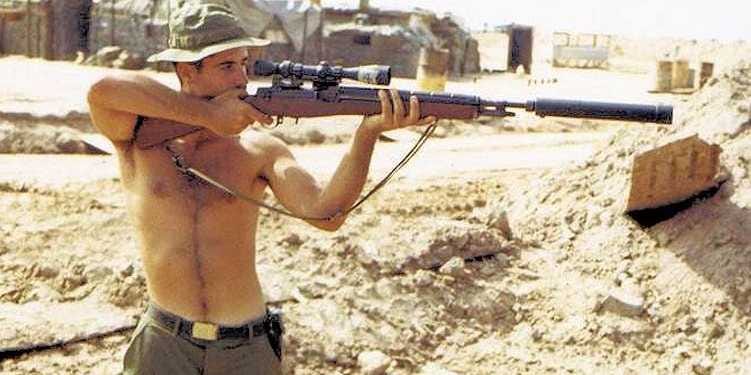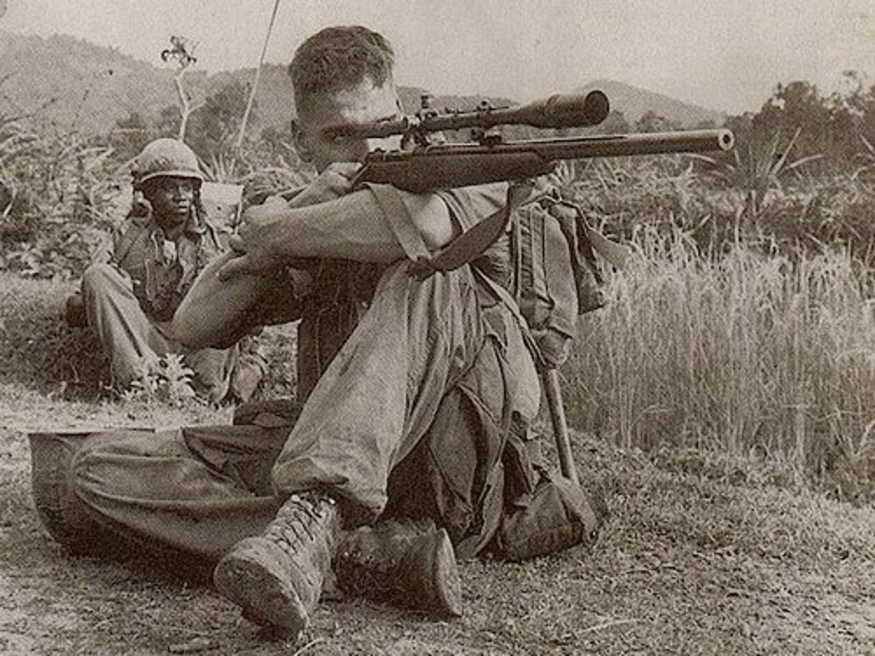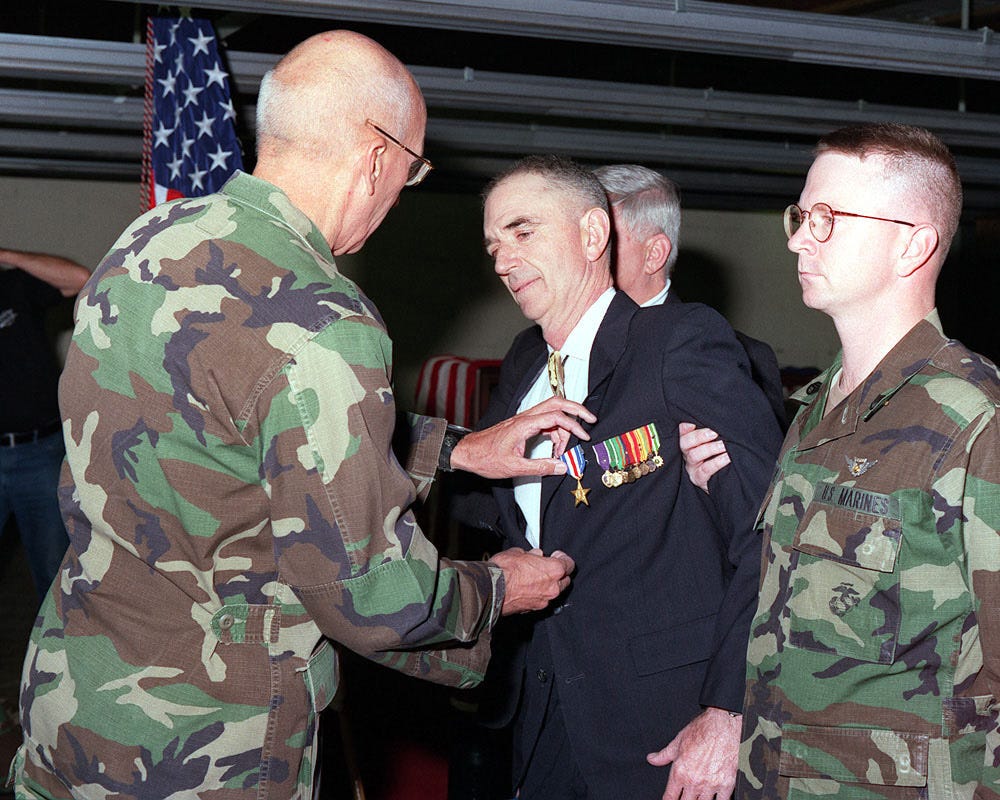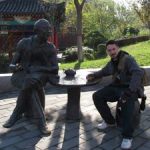
USMC Archives
- Gunnery Sgt. Carlos Hathcock holds the Marine Corps record for the longest confirmed sniper kill shot.
- The late Marine sniper set the record in 1967 with a M-2 .50 caliber Browning machine gun.
- With 93 confirmed kills, Hathcock is one of the deadliest snipers in the Corps' history.
- Visit the Business section of Insider for more stories.
A Marine sniper killed an enemy soldier 1.4 miles away in 1967 with a .50 caliber Browning machine gun. To this day, it remains the Corps' longest confirmed sniper kill shot.
The tales of Gunnery Sgt. Carlos Hathcock's exploits in the jungles of Vietnam are legendary. With 93 confirmed kills and around 300 unconfirmed, he is one of the deadliest Marine Corps snipers in history.
The enemy gave Hathcock the nickname Long Tra'ng du K'ich, "White Feather Sniper," because he notoriously hunted with a white feather tucked into the band of his bush hat.
Hathcock learned of the nickname after the Viet Cong put out a hit on him, offering to pay handsomely any soldier who killed Long Tra'ng and his commanding officer, Capt. Jim Land. The bounty on each of their heads was three years officer's pay.
Many snipers tried to best Hathcock and claim their prize, but none succeeded. There were some close calls though.
One enemy sharpshooter came dangerously close to killing Hathcock in an intense battle near the firebase at Hill 55. In the final moments of the fight, the two snipers had each other in their sights, each man ready to end the other's life, but Hathcock was faster on the trigger. He put a bullet clean through the man's scope, killing him instantly.

Marine Corps Archives
'The longest-reaching sniper weapon'
And that was far from Hathcock's only outstanding shot. During the war, Hathcock also set a US military record for the longest confirmed sniper kill shot. That record held for almost four decades.
From a hill in Duc Pho, Hathcock shot an enemy in the head at 2,500 yards with an M-2 .50 caliber machine gun known as "Ma Deuce," Charles Henderson wrote in "Marine Sniper," his novelized biography of Hathcock.
"This is the longest-reaching sniper weapon, the M-2 .50 caliber machine gun," Land, Hathcock's CO, told a group of war reporters at one point, according to Henderson. He said the weapon was "effective out to three thousand yards," well beyond Hathcock's Winchester Model 70 .30-06 caliber rifle.
Marine snipers could equip the Browning machine gun with either a Unertl Optical Company or Lyman Gunsight Corporation eight-power scope, the same ones the snipers put on their rifles, and provide "a battalion commander the benefit of extra long-range sniper fire," Land said.
Hathcock's longest confirmed kill shot before he was sent to Duc Pho for combat operations in early 1967, was at less than 1,200 yards, Henderson, a former Marine sniper, wrote in the follow-on book "Silent Warrior."
Use of the M-2 machine gun as a sniper weapon began during the Korean War and continued during the Vietnam War.
While the Marine Corps still uses heavy machine guns, its snipers generally do not. "Scout Sniper platoons are not equipped with these assets in their internal sections but have the ability to request or utilize them if the mission requires," the Corps told Insider.
"In the formal Scout Sniper curriculum, Marines are only trained on the prescribed Scout Sniper Rifles that are organic to their units' table of equipment," it said.
The Scout Sniper community does not officially keep records ranking its confirmed kills by distance, though the Marine Corps was able to confirm for Insider that Hathcock still holds the service's record for the longest confirmed sniper kill shot.
As for why it does not keep official records, the Corps said that "close range or long range is little concern to Scout Snipers as long as an enemy combatant is neutralized."
Hathcock, who helped build and shape the modern Marine Corps Scout Sniper program with his former commanding officer, Land, and others, held a similar view, considering numbers and records largely meaningless.

Department of Defense
'A meaningful thing about numbers'
For many years, Hathcock was thought to have the most confirmed kills of any Marine Corps sniper. It is actually Sgt. Charles "Chuck" Mawhinney, but even when it was believed to be Hathcock, that never mattered to him, according to Henderson.
During a discussion about his kill count, Hathcock once told a fellow Marine that "you can take those numbers and give 'em to someone who gives a damn about 'em."
"It's my job," he said. "If I don't get those bastards, then they're gonna kill a lot of these kids dressed up like Marines. That's the way I look at it."
Hathcock is probably the Marine Corps' most famous sniper, but his success was not measured simply in bodies or yards. Hathcock prided himself on doing his job well, not ending the lives of as many as 400 enemy troops.
"You would have to be crazy to enjoy killing," he often said, according to Henderson. "I never enjoyed it. It was my job. It was important that I did it well."
The sniper said that "if there was a meaningful thing about numbers, it would have been the number of lives I saved. Not the number I took."
Although the Vietnam War did not end until the mid-1970s, it ended for Hathcock in 1969 after he suffered severe burns across most of his body while pulling Marines from a burning troop carrier that struck a mine.
Hathcock, his body on fire as he did it, saved the lives of seven of his fellow Marines. For his heroism, he eventually received the Silver Star.
Hathcock's 2,500-yard shot in Vietnam is among the top seven longest known sniper kill shots worldwide and is the second longest in the US military.
His record for the longest confirmed kill shot by a US military sniper was broken by a US Army Ranger in 2004, roughly five years after he died of multiple sclerosis.
The disease, together with his injuries from war, did what his enemy in Vietnam never could, but not before Hathcock left a lasting impact on the Marine Corps.
Hathcock trained hundreds of snipers. He spent his life demonstrating and teaching, as Henderson wrote, "that the deadliest thing on the battlefield is one well-aimed shot."
When Hathcock left the Marine Corps at just under 20 years of service, a commanding officer presented the legendary sniper with an M40A1 sniper rifle.
He was also presented with a plaque that read: "There have been many Marines, and there have been many marksmen, but there has been only one sniper - Gunnery Sergeant Carlos N. Hathcock. One Shot - One Kill."
